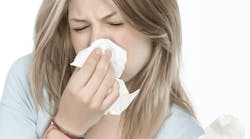Why do sick employees come in to work? They feel they're “essential,” or have too much on their plates. A survey from Kimberly-Clark Professional found that 59 percent of people go to work when they’re sick. Three in 10 said it was because they were too important to the business operation.
A cough, a sneeze, an unwashed hand touching an elevator button, stair railing, ATM machine or other “hot spot” in an office or other location – that’s all it takes to spread cold and flu germs.
“Germs can be spread throughout the workplace and elsewhere when people touch hot spots that have been contaminated by people who are ill,” said Dr. Charles Gerba, professor of microbiology at the University of Arizona. “That’s why individual efforts can make such a big difference. If you stay home when you're sick, you won’t be passing your germs around the break room and other places.”
While you may not be able to change the behavior of others, there are things you can do to protect yourself. Chief among them is to wash, wipe and sanitize.
"More than one third of people say they are germ anxious and want to take steps to protect themselves against other people's germs," said Elane Stock, president, Kimberly-Clark Professional.
Here are some actions you can take to prevent the spread of flu:
Speak up – Ask your human resources or building manager to provide hand sanitizer, disinfecting wipes, soap and facial tissue.
Take steps to prevent the spread of germs – Cover your nose and mouth with a tissue when you sneeze and then throw the tissue away. If you don't have a tissue handy, cough or sneeze into the inner part of your sleeve at the elbow.
If you get sick, stay home – Don’t put other people at risk because you feel you’re too “essential” to stay away from the office. If you do become sick with a flu-like illness, the CDC recommends that you stay home for at least 24 hours after your fever is gone.

